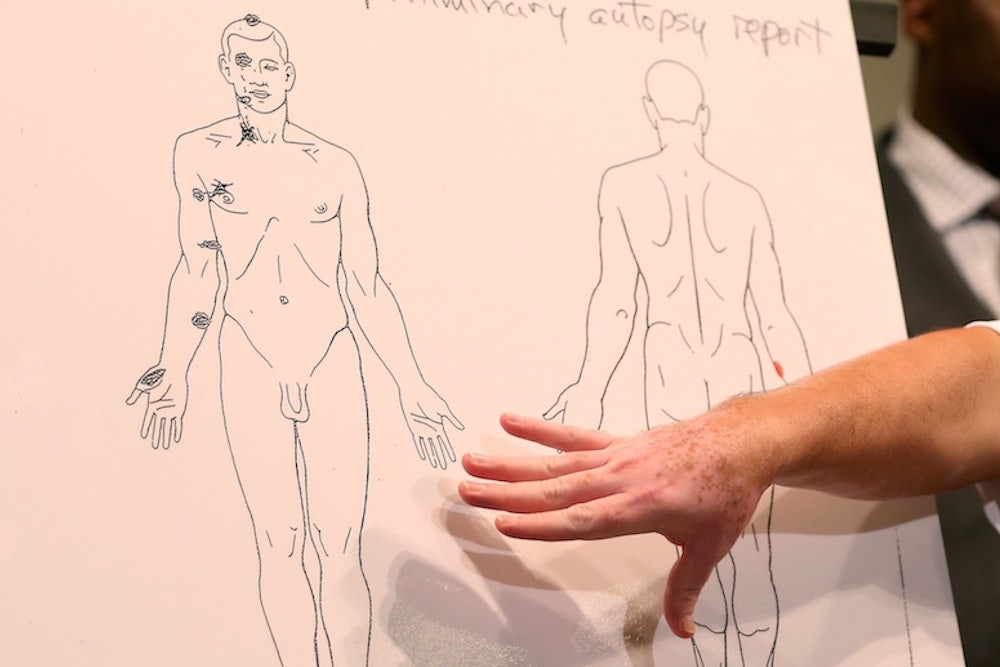The killing of 18-year-old Michael Brown in Ferguson, Missouri, by St. Louis County police officer Darren Wilson prompted massive protests in Ferguson and in cities all over the nation. Protestors and others have demanded accountability, often asking that murder charges be brought against Wilson. Although much attention has been focused on the police department, largely because of its violent confrontations with protesters and the massive use of paramilitary equipment, accountability for the killing of Michel Brown rests in the hands of one person—the prosecutor.
Police officers investigate cases and make arrests, but the decision to charge a person with a crime is totally within the discretion of the prosecutor. A prosecutor is never required to file criminal charges against a person, even if she is firmly convinced that she can prove the case beyond a reasonable doubt (the legal standard for proving guilt in a criminal trial). Prosecutors frequently decline to bring charges, even when they are convinced of the person’s guilt. Perhaps it’s a minor offense and the suspect is a first offender. Maybe the victim is not interested in prosecution. Or maybe the prosecutor doesn’t believe she can secure a conviction. But the bottom line is that prosecutors are not required to justify their charging decisions to anyone, and there is much potential for abuse. Prosecutors have almost limitless discretion in making these decisions, and a series of Supreme Court decisions has made it almost impossible for anyone to challenge them. Some states have a grand jury process, but the grand jury is controlled entirely by the prosecutor. Neither the defendant nor his attorney is allowed to be present during grand jury hearings, and prosecutors almost always decide which witnesses to present.
Bob McCulloch is the prosecutor for St. Louis County and has held the position for 23 years. McCulloch has stated that he will present the evidence of Michael Brown’s killing to a grand jury, but members of the African-American community have expressed concern about his ability to be fair. There is always such a concern in cases involving the investigation of police officers. Police officers don’t technically work for prosecutors, but they are definitely part of the prosecution team. They investigate the cases, gather the evidence, and testify as witnesses for the state. Without police officers, prosecutors can’t bring cases or secure convictions. So prosecutors have an inherent conflict of interest when they are considering charges against police officers.
The conflict seems particularly deep-seated in this case. Bob McCulloch’s father was a police officer who was killed in the line of duty when McCulloch was a child. And McCulloch was very critical of Missouri Governor Jay Nixon’s decision to place the Missouri State Troopers in charge of security after complaints about the St. Louis police department’s violent attacks on peaceful protestors and journalists. McCulloch called the governor’s decision “shameful” and accused him of “denigrat[ing] the men and women of the county police department.”
St. Louis County Executive Charlie Dooley and others have asked Missouri Attorney General Chris Koster to remove McCulloch from the case and have called for the appointment of a special prosecutor, claiming that McCullough is too biased to be fair. Missouri law permits a judge to appoint a special prosecutor, but judges rarely make such appointments unless the conflict is clear, as in a case where the prosecutor is related to one of the parties or has some other kind of relationship with a party or key witness. A special prosecutor seems unlikely in this case.
Prosecutors are the most powerful officials in the criminal justice system. Most state and local prosecutors are elected officials, so theoretically, the electoral system should permit their constituents to hold them accountable. If a prosecutor’s constituents are displeased with him, they can vote him out of office. Of course, elections come along every four years at best. And voters rarely have access to the most important information that would allow them to make an informed decision. Charging decisions are made behind closed doors, and prosecutors don’t talk about their charging policies when they run for reelection. Usually they talk about being tough on crime and little else. Most, like McCulloch, run unopposed for years. This year he handily beat a challenger in the primary election and has no Republican opponent. So for now, the people of St. Louis County have little to no leverage over McCulloch. If they are dissatisfied with how he handles this case, they will have to wait another four years to punish him.
There is another option. Attorney General Eric Holder has already sent the FBI and Justice Department officials to Ferguson to do their own investigation. Whether or not McCulloch charges Officer Wilson with some form of homicide, federal prosecutors may seek criminal civil rights charges. If they don’t, there may not be peace on the streets of Ferguson, Missouri, for a very long time.
